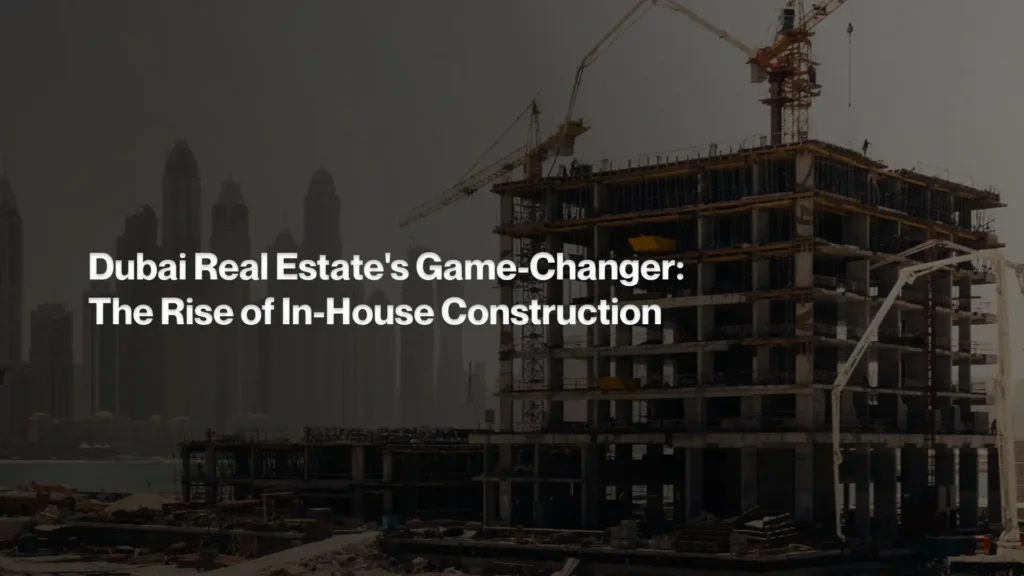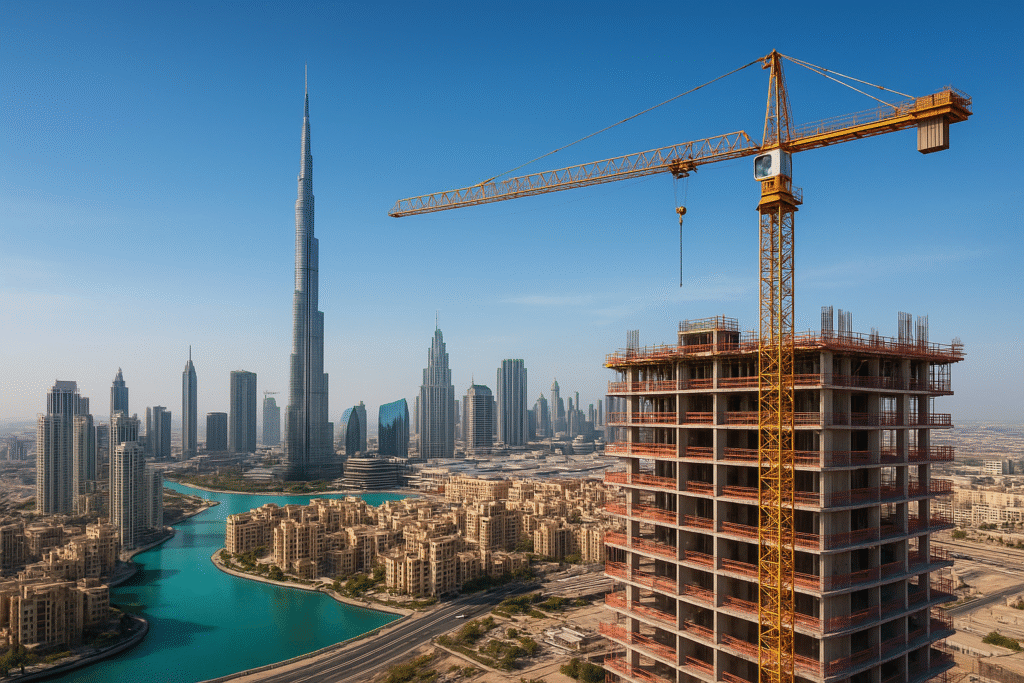The Dubai real estate market has long been recognized as one of the most dynamic and innovative in the world. With its futuristic skyline, record-breaking projects, and bold architectural designs, Dubai continues to set benchmarks in property development. However, a new transformation is reshaping the market — the rise of in-house construction. This strategy is rapidly becoming the ultimate game-changer for developers, investors, and homeowners alike.
In this article, we will explore the driving factors behind this trend, its impact on cost efficiency, quality assurance, project timelines, and how it positions Dubai as a global leader in real estate innovation.
The Evolution of Dubai’s Real Estate Landscape

Dubai’s property sector has transitioned from speculative investments in the early 2000s to a more mature and sustainable development model. Initially, developers relied heavily on outsourcing contractors for design, construction, and delivery. While this fueled rapid growth, it also created challenges such as delays, rising costs, and inconsistent quality.
In-house construction is now emerging as the preferred approach, offering end-to-end control and aligning projects with the high standards Dubai is known for.
What is In-House Construction in Real Estate?
In-house construction refers to developers managing most or all aspects of a project internally rather than outsourcing to multiple external contractors. This includes:
- Design and architecture
- Project management
- Engineering and technical expertise
- Procurement and materials sourcing
- Construction and quality assurance
By adopting this model, developers reduce dependency on third parties, creating a streamlined process with greater accountability and precision.
Why In-House Construction is Becoming Dubai’s Game-Changer

1. Cost Efficiency and Better ROI
In a highly competitive market, developers must control costs without compromising quality. In-house construction eliminates middlemen, minimizes inflated contractor charges, and optimizes resource allocation. This translates into higher returns on investment (ROI) for both developers and investors.
2. Faster Delivery Timelines
One of the biggest challenges in real estate development is meeting deadlines. Delays not only increase costs but also reduce investor confidence. With in-house construction, developers have direct control over timelines, ensuring faster project completion and earlier property handovers.
3. Enhanced Quality Control
Dubai is synonymous with luxury and innovation. To maintain this reputation, consistent quality standards are crucial. In-house teams can monitor every stage of development, from selecting premium materials to executing flawless finishes. This assures buyers of long-lasting value.
4. Greater Customization for Buyers
With in-house teams, developers can respond faster to buyer preferences such as layout modifications, interior upgrades, or sustainable features. This personalization strengthens buyer satisfaction and boosts Dubai’s appeal to international investors seeking tailor-made real estate solutions.
5. Sustainable and Green Building Practices
The UAE government has been pushing toward sustainability and eco-friendly development. In-house construction allows developers to directly integrate green technologies, energy-efficient materials, and smart building systems. This aligns with Dubai’s ambition of becoming a global leader in sustainable urban living.
Impact on Developers and Investors
Developers: Stronger Brand Identity
Developers that manage construction internally establish a distinct brand reputation for reliability, innovation, and superior quality. Projects delivered on time with consistent craftsmanship attract repeat investors and strengthen long-term market positioning.
Investors: Increased Confidence and Security
Investors, especially from overseas, value transparency and accountability. In-house construction offers clear oversight, reducing risks associated with third-party contractors. This makes Dubai real estate more attractive as a secure and lucrative investment hub.
Case Studies of In-House Construction Success in Dubai
Emaar Properties
As one of Dubai’s most recognized developers, Emaar has increasingly adopted in-house strategies for large-scale projects like Dubai Creek Harbour. By managing construction elements directly, Emaar ensures world-class standards while maintaining strict timelines.
DAMAC Properties
Known for its luxury developments, DAMAC has leaned into in-house construction to guarantee the delivery of iconic projects such as DAMAC Lagoons. Their focus on quality and innovation enhances brand credibility across global markets.
Sobha Realty
Sobha Realty is widely regarded as a pioneer in Dubai’s in-house construction approach. From design to delivery, Sobha controls every aspect of its developments, resulting in unmatched precision engineering and premium finishes.
The Role of Technology in In-House Construction
Dubai’s drive toward smart cities and digital transformation is boosting in-house construction. Developers are leveraging technology such as:
- Building Information Modeling (BIM): Enhances collaboration and accuracy in design.
- 3D Printing: Reduces costs and accelerates construction.
- Drones: For real-time monitoring of progress and site inspections.
- AI & Data Analytics: Predicts project risks, optimizes resources, and improves efficiency.
By integrating these innovations, Dubai’s in-house construction not only raises efficiency but also sets new global benchmarks.
Future Outlook: How In-House Construction Shapes Dubai’s Skyline
The adoption of in-house construction is not a passing trend; it is set to redefine Dubai’s urban growth strategy. Over the next decade, we can expect:
- More luxury and affordable housing projects completed ahead of schedule.
- Stronger emphasis on green, smart, and sustainable developments.
- Increased investor confidence due to greater transparency.
- A more competitive edge for Dubai in the global real estate arena.
Conclusion: The Ultimate Competitive Advantage
The rise of in-house construction in Dubai real estate represents a paradigm shift that benefits all stakeholders. Developers gain efficiency, investors enjoy greater security, and buyers receive exceptional quality. More importantly, this approach reinforces Dubai’s reputation as a global hub for innovation, luxury, and sustainability in real estate.
As more developers embrace this model, in-house construction is set to become the cornerstone of Dubai’s real estate success story, ensuring that the city’s skyline continues to inspire the world.
